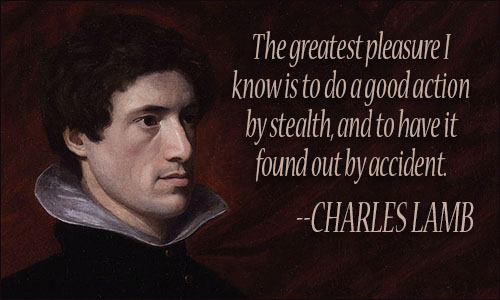CHARLES LAMB QUOTES
English essayist and critic (1775-1834)

A pun is a pistol let off at the ear; not a feather to tickle the intellect.
CHARLES LAMB
"Popular Fallacies", Last Essays of Elia
What a place to be is an old library! It seems as though all the souls of all the writers, that have bequeathed their labours ... were reposing here, as in some dormitory, or middle state. I do not want to handle, to profane the leaves, their winding-sheets.
CHARLES LAMB
Elia and the Last Essays of Elia
The going away of friends does not make the remainder more precious. It takes so much from them as there was a common link. A. B. and C. make a party. A. dies. B. not only loses A. but all A.'s part in C. C. loses A.'s part in B., and so the alphabet sickens by subtraction of interchangeables.
CHARLES LAMB
letter to William Wordsworth, Mar. 20, 1822
Credulity is the man's weakness, but the child's strength.
CHARLES LAMB
"Witches and Other Night Fears", Essays of Elia
A book reads the better which is our own, and has been so long known to us, that we know the topography of its blots, and dog's ears, and can trace the dirt in it to having read it at tea with buttered muffins.
CHARLES LAMB
letter to Samuel Taylor Coleridge, Oct. 11, 1802
Are there no solitudes out of the cave and the desert; or cannot the heart in the midst of crowds feel frightfully alone?
CHARLES LAMB
"Estimate of De Foe's Secondary Novels", The Works of Charles and Mary Lamb: Miscellaneous prose, 1798-1834
Not many sounds in life, and I include all urban and rural sounds, exceed in interest a knock at the door.
CHARLES LAMB
"Valentine's Day", Essays of Elia
I am determined my children shall be brought up in their father's religion, if they can find out what it is.
CHARLES LAMB
letter to John Chambers, 1817
Men marry for fortune, and sometimes to please their fancy; but, much oftener than is suspected, they consider what the world will say of it--how such a woman in their friends' eyes will look at the head of a table. Hence we see so many insipid beauties made wives of, that could not have struck the particular fancy of any man that had any fancy at all.
CHARLES LAMB
"Table-Talk and Fragments of Criticism", The Life and Works of Charles Lamb
I love to lose myself in other men's minds.
CHARLES LAMB
"Detached Thoughts on Books and Reading", Last Essays of Elia
A man can never have too much Time to himself, nor too little to do. Had I a little son, I would christen him Nothing-To-Do; he should do nothing. Man, I verily believe, is out of his element as long as he is operative. I am altogether for the life contemplative.
CHARLES LAMB
"The Superannuated Man", Last Essays of Elia
There is a pleasure in affecting affectation.
CHARLES LAMB
"Table Talk", Works: Essays and Sketches
We are ashamed at the sight of a monkey--somehow as we are shy of poor relations.
CHARLES LAMB
"Table-Talk and Fragments of Criticism", The Life and Works of Charles Lamb
I can scarce bring myself to believe, that I am admitted to a familiar correspondence, and all the license of friendship, with a man who writes blank verse like Milton.
CHARLES LAMB
letter to Samuel Taylor Coleridge, Feb. 13, 1797
Books of quick interest, that hurry on for incidents are for the eye to glide over only. It will not do to read them out. I could never listen to even the better kind of modern novels without extreme irksomeness.
CHARLES LAMB
"On Books and Reading", The Last Essays of Elia
It is with some violation of the imagination that we conceive of an actor belonging to the relations of private life, so closely do we identify these persons in our mind with the characters which they assume upon the stage.
CHARLES LAMB
attributed, Day's Collacon
The greatest pleasure I know is to do a good action by stealth, and to have it found out by accident.
CHARLES LAMB
"Table-Talk and Fragments of Criticism", The Life and Works of Charles Lamb
A laugh is worth a hundred groans in any market.
CHARLES LAMB
Bon-Mots
He has left off reading altogether, to the great improvement of his originality.
CHARLES LAMB
Essays of Elia
Antiquity! thou wondrous charm, what art thou? that being nothing art everything? When thou wert, thou wert not antiquity -- then thou wert nothing, but hadst a remoter antiquity, as thou calledst it, to look back to with blind veneration; thou thyself being to thyself flat, jejune, modern! What mystery lurks in this retroversion? or what half Januses are we, that cannot look forward with the same idolatry with which we for ever revert! The mighty future is as nothing, being everything! the past is everything, being nothing!
CHARLES LAMB
"Oxford in the Vacation", Elia and the Last Essays of Elia